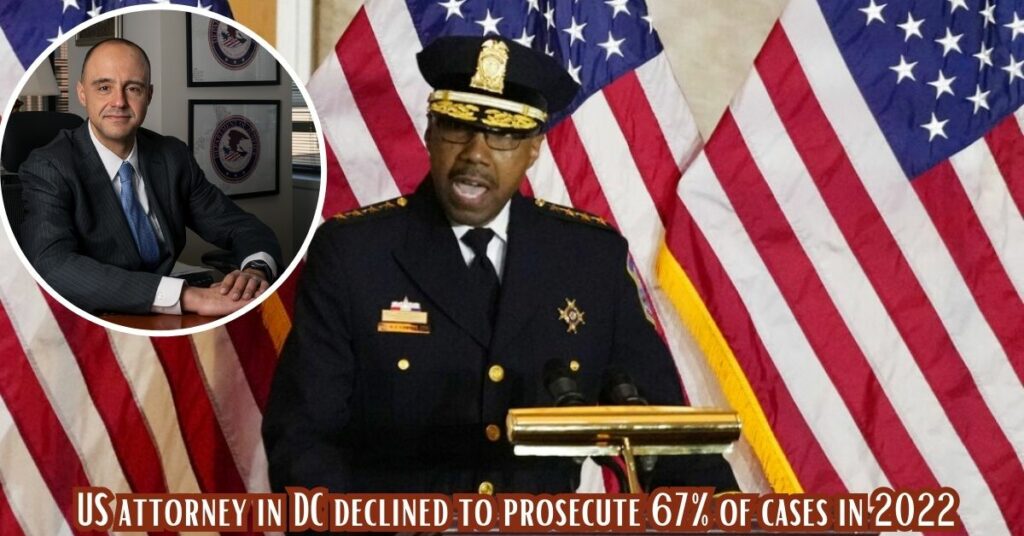U.S. Attorney for the District of Columbia almost doubled the rate at which he or she declined to prosecute within the last seven years in 2022, declining to prosecute nearly 70% of those arrested by police officers. According to data that was first reported by the Substack newsletter DC Crime Facts, the percentage of cases that were not prosecuted has increased to 67% from 35% in 2015.
U.S. In an interview with the Washington Post, attorney Matthew Graves cited factors such as an unaccredited crime lab and police body-camera footage leading to severe scrutiny as reasons for not prosecuting less serious criminal cases. According to Graves, his office typically does not pursue cases involving charges of gun possession, drug possession, or burglary.
In 2021, the Department of Forensic Sciences lost its accreditation, forcing prosecutors to pay out-of-state labs to analyze DNA, weapon, and fingerprint evidence. According to Graves, the most serious crimes receive the most requests for information.
All the below statements are Given By Microsoft Start,
“We are now entering year three of DFS being shut down without any clear plan of coming back online. We have to prioritize violent felonies and make sure we are doing the forensic testing for those cases. Our office is often bearing the cost for this analysis,” he said.
Metropolitan Police Chief Robert Contee has publicly said that his department’s lack of prosecutions is not the fault of the police personnel. “I can promise you, it’s not MPD holding the bag on this,” he told the Washington Post. “That’s B.S.”
However, the United States Attorney’s Office also handles federal cases in the United States District Court and Superior Court for the district. As compared to other similarly crime-infested cities like Philadelphia and Chicago, the District Court’s 67% denial rate stands out.
Office statistics show a 4% decrease in the number of Philadelphia prosecutors and a 14% decrease in the number of Cook County prosecutors in Chicago. The police chief in Washington stated, “Of course we are concerned,” about the dropping prosecution rates.“We believe every person we arrest should be off the streets.”
Here are some additional sources to read about California news at your convenience:
- Florida Attorney Missing Lawyer’s Doctor Accused of Murder
- Man Arrested in Seattle for Breaking Company Door With Pickaxe
- Tbis Were Suffered By 6 American Servicemen In The Syria Attacks
These figures emerge as the District of Columbia struggles to control its own criminal justice system in the face of rising crime rates and scrutiny from federal lawmakers. According to the national pattern, violent crime is on the down in the district, although property and auto theft and robberies are on the rise and have yet to return to pre-pandemic levels.
Homicides in Washington have gone up 19% since this time in 2022, while violent crime has gone up only 1%. Nonetheless, theft of motor vehicles has climbed by 108%, and theft of other property by 27%. As of this past Wednesday, the district’s crime rate was 22% higher than the same time previous year.
D.C. U.S. Attorney declined to prosecute 67% of those arrested. Here’s why. https://t.co/OXqv4FvWqe
— The Washington Post (@washingtonpost) March 29, 2023
Recently, the DC Council attempted to approve a crime bill that would have rewritten Washington state’s century-old criminal code and lightened punishments for certain crimes, including murder. On February 9th, the House voted to repeal the measure, and on March 8th, the Senate did the same.
A few days later, President Joe Biden signed the law after previously promising not to veto it. The number of people arrested in Washington for crimes like gun possession, drug possession, and burglary has reduced by 22%, according to Attorney General Graves.
The office of the district attorney, he added, successfully prosecuted 87.9 percent of homicide, armed carjacking, first-degree sexual assault, and assault with intent to kill cases last year. According to data provided to the Washington Post, this is an increase from 2021, when just 85.7% of cases were prosecuted, but a decrease from 2018, when 95.6% of cases were prosecuted.
“The bottom line is that it creates the impression that this is an across-the-board decrease in the number of cases we are bringing. That is simply not true,” Graves said.
Graves noted that police body cam footage may have had a role in the decrease in prosecutions, since it provides evidence that can help prosecutors determine if a crime has been committed at an early stage, thereby avoiding unnecessary court hearings.
“Since 2019, we have been taking more time at arrest to determine if we are going to file charges. With body-worn camera and the proliferation of surveillance cameras, we have more information at the charging stage to assess the strength of the evidence we would be presenting later to courts and juries,” Graves said.
However, according to Contee, prosecutors may be less eager to press a case if they have concerns about witnesses.
“But those are often the very individuals who witness such crimes. We can’t pick our witnesses, especially in neighborhoods where these crimes are happening. I wish we could have boy and girl scouts as witnesses, but that’s often just not the case,” he said.
Former federal homicide prosecutor Deborah Sines told the Washington Post that the United States Attorney’s Office is hampered by “poor police work” and officials “who only want to try slam-dunk cases.”
“I would get angry when I would see defendants in homicide cases in front of me who had previous gun possession charges that a prosecutor had previously dismissed. Some cases are going to be challenging, yes. But that’s your job. Do your job. Don’t just dismiss it just because the evidence is not everything you want it to be or think it should be,” she said.
Read the California Examiner daily for current news and analysis.
